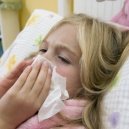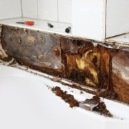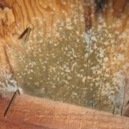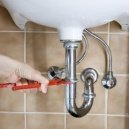Find a pre-screened local mold removal specialist Free Estimate
Find a Mold Specialist Now
Click or Call, Toll-Free 24/7
Hives From Mold Exposure
Mold is all around us, both indoors and out. Many people never notice it. Some people are allergic to mold, though. Their immune systems react to mold as if it’s a harmful substance and launch an immune response that can trigger many unpleasant symptoms, including hives.
Allergies to outdoor mold often occur seasonally, like during the rainy season. You can’t control the weather or the amount of mold in the outdoor environment, so you may need to take medication to treat your symptoms if they are severe.
Allergies to indoor mold usually only happen when there is a larger-than-normal amount of mold inside or when the type of mold growing indoors is a particularly harmful type, like Stachybotrys chartarum, sometimes referred to as black mold. Some people may be extraordinarily susceptible to mold and develop symptoms when exposed to very small amounts of mold, but usually allergy symptoms like hives don’t develop until an unusual amount of mold is present in the home.
Other Symptoms of Mold Allergy
Hives are only one symptom of an allergy to mold. According to the American College of Allergy, Asthma and Immunology(1), other common symptoms include respiratory symptoms like coughing, sneezing, runny nose, trouble breathing, sore throat, and itchy, watery eyes. Symptoms may also include headaches and fatigue.
Hives
Hives, technically known as urticaria, are itchy red bumps or blotches on the skin that occur as a result of an allergic reaction. The bumps may be tiny or the blotches may be several inches in diameter. You may have just a few hives or they may cover much of your body.
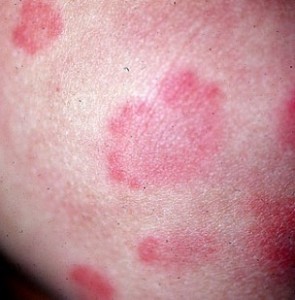
Of course, mold is not the only substance that can trigger an allergic reaction and hives. Hives can be triggered by allergic reactions to all sorts of things, including pet dander, pollen, certain foods and many medications. Your doctor or an allergist can help you figure out what’s causing your hives if you’re not sure. Let your doctor know if you think you’re allergic to mold or if you’ve been exposed to mold, like if you’ve noticed mold in your home or if your home has a musty smell (which is almost always indicates mold is growing somewhere).
Coping with Hives from Mold
The itching from hives can be intense. To help relieve itching, the Mayo Clinic(2) recommends taking an over-the-counter antihistamine like Benadryl, applying cool damp compresses to the area, and taking cool baths with baking soda or colloidal oatmeal added to the bathwater. If over-the-counter medications and home remedies don’t relieve your discomfort, see your doctor.
In order to get rid of the hives, though, you’ll need to get rid of the mold that is triggering the allergic reaction. If you continue to be exposed to mold, you’ll continue to have symptoms. Continued exposure to mold may even cause your symptoms to worsen over time.
It’s also important to understand that mold grows and spreads quickly. If you have mold in your home that is causing hives or other symptoms, it’s important to have the mold removed as soon as possible, not only to prevent worsening health, but also to prevent the mold problem from getting bigger and bigger.
If Mold is Giving You Hives
If mold is giving you hives, you need to have all the mold removed from your home as soon as possible. While some homeowners prefer to handle mold removal themselves, it’s generally recommended that you avoid attempting to remove mold if you have mold-related illness or are allergic to mold. The process of removing mold stirs up mold spores, which are easily inhaled. In addition, the mold spores can easily spread to other areas of the home which can end up making a household mold problem worse instead of better, unless strict precautions are taken.
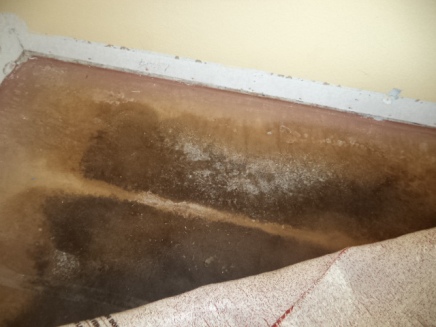 Mold Growing Under Carpet
Mold Growing Under CarpetGet Professional Advice
Perhaps the best thing you can do is seek some professional advice. Experienced mold removal specialists will usually visit your home, inspect for mold, give you a free written estimate for the cost of mold removal, answer any questions you may have, and offer free expert advice, all at no cost to you and with no obligation on your part. We encourage you to take advantage of this, even if you plan to handle the mold removal on your own. A professional can make sure you’ve located all the mold in your home and advise you about the safety precautions you’ll need to take. Follow this link to find qualified mold removal specialists offering free consultations in your area.
Return From Hives To Our Main Symptoms Page
(1)ACAAI - Mold Allergy
(2)Mayo Clinic - Hives
Free Home Inspection By A Mold Removal Specialist
Search This Website
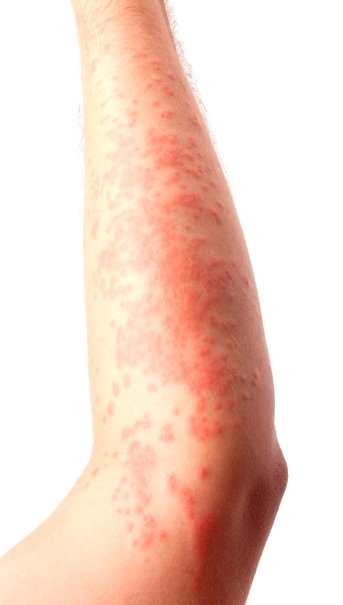 Hives on Boys Arm
Hives on Boys ArmRecent Articles
-
See Our 5 Recommended Mold Removal Companies in Covington, KY
Apr 16, 25 12:59 PM
-
See Our 5 Recommended Mold Removal Companies in Wheaton, IL
Jun 20, 24 10:33 AM
-
See Our 5 Recommended Mold Removal Companies in Aberdeen, SD
Oct 08, 21 04:05 PM
